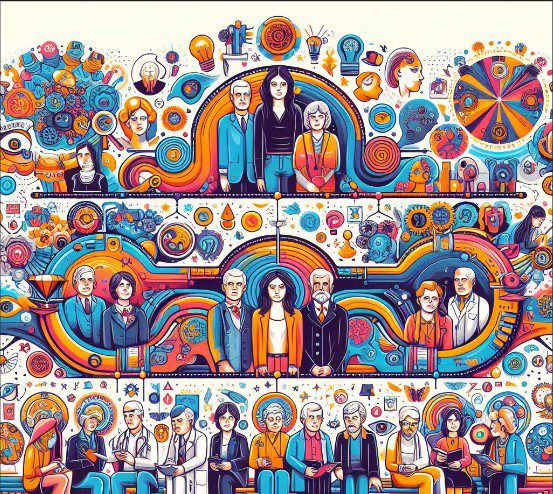Psychology, the scientific study of human behavior and mental processes, has a rich and fascinating history. It has evolved from philosophical speculation to an empirical science that integrates biology, neuroscience, and artificial intelligence. Understanding the history and evolution of psychology helps us appreciate its progress and how it continues to shape modern life.
Over the centuries, psychology has undergone significant transformations. Early thinkers pondered questions about the soul and consciousness, while modern researchers rely on data, experiments, and technology to understand the human mind. From the philosophical debates of Plato and Aristotle to the cognitive revolution and beyond, psychology’s journey is one of discovery, controversy, and continuous evolution.
This article traces the historical milestones of psychology, highlighting the major schools of thought and the contributions of key figures who have shaped the field.
Ancient Roots of Psychology
Psychology in Ancient Philosophy
The origins of psychology can be traced back to ancient civilizations, where philosophers sought to understand human nature, consciousness, and behavior.
- Plato (427–347 BCE) – Believed that the mind and body were separate (dualism) and that knowledge was innate.
- Aristotle (384–322 BCE) – Rejected Plato’s idea of innate knowledge and argued that knowledge comes from experience (empiricism). His work De Anima laid the foundation for later psychological thought.
- Hippocrates (460–370 BCE) – Proposed that personality was influenced by bodily fluids (humors), an early biological perspective on psychology.
Psychology in Eastern and Islamic Thought
While Western philosophy influenced early psychology, significant contributions also came from Eastern and Islamic scholars:
- Confucius (551–479 BCE) – Emphasized moral psychology and the role of environment in shaping human behavior.
- Avicenna (980–1037 CE) – A Persian physician who wrote extensively about emotions, mental illness, and perception, foreshadowing modern cognitive psychology.
These early ideas laid the groundwork for later psychological theories, although psychology remained a branch of philosophy until the 19th century.
The Birth of Psychology as a Science
Wilhelm Wundt and Structuralism (1879)
The turning point in psychology’s evolution came when Wilhelm Wundt established the first experimental psychology laboratory in Leipzig, Germany, in 1879. He is known as the “father of psychology” because he separated psychology from philosophy and applied scientific methods to study the human mind.
Wundt’s approach, called structuralism, focused on breaking down mental processes into their basic elements. He used introspection, a method where individuals reported their conscious thoughts and sensations.
William James and Functionalism (Late 19th Century)
In response to structuralism, William James, an American psychologist, developed functionalism, which emphasized studying the purpose of mental processes rather than their structure.
Functionalism focused on:
- How consciousness helps people adapt to their environment.
- The relationship between mental processes and behavior.
James’s ideas were influenced by Charles Darwin’s theory of evolution, and functionalism laid the foundation for later psychological perspectives, including behaviorism and cognitive psychology.
Early Schools of Psychology
Psychoanalysis – Sigmund Freud (Late 19th – Early 20th Century)
One of the most influential but controversial figures in psychology, Sigmund Freud introduced psychoanalysis, a theory that emphasized the role of the unconscious mind in shaping behavior.
Key concepts of psychoanalysis:
- The unconscious mind – Repressed thoughts and desires influence behavior.
- Psychosexual development – Childhood experiences shape personality.
- The id, ego, and superego – Different parts of the psyche regulate behavior.
Freud’s work influenced psychotherapy and introduced concepts like defense mechanisms and dream analysis, which remain relevant today.
Behaviorism – John Watson and B.F. Skinner (Early 20th Century)
By the early 20th century, psychology shifted towards behaviorism, rejecting introspection and focusing only on observable behavior.
- John B. Watson (1913) – Argued that psychology should study behavior, not consciousness. He conducted the famous “Little Albert” experiment, demonstrating conditioned emotional responses.
- B.F. Skinner (1940s-50s) – Developed operant conditioning, showing how behavior is shaped by rewards and punishments.
Behaviorism dominated psychology for decades and influenced areas like education, therapy, and marketing.
Gestalt Psychology – Max Wertheimer (1910s-30s)
Gestalt psychology, founded by Max Wertheimer, Kurt Koffka, and Wolfgang Köhler, opposed structuralism and argued that the mind perceives things as wholes rather than individual parts.
Gestalt principles influenced:
- Perception and cognition
- Problem-solving and creativity
The Cognitive Revolution (1950s-60s)
Cognitive Psychology – Noam Chomsky and Jean Piaget
By the mid-20th century, behaviorism faced criticism for ignoring mental processes. The cognitive revolution brought back the study of thoughts, memory, and problem-solving.
Key figures:
- Noam Chomsky (1957) – Criticized behaviorism’s explanation of language learning and emphasized the role of mental structures.
- Jean Piaget (1936) – Developed theories of cognitive development, explaining how children’s thinking evolves in stages.
Cognitive psychology led to advancements in artificial intelligence, neuroscience, and education.
Modern Psychology (Late 20th Century – Present)
Humanistic Psychology – Carl Rogers and Abraham Maslow
In response to behaviorism and psychoanalysis, humanistic psychology emerged in the 1950s, emphasizing personal growth and self-actualization.
- Carl Rogers – Developed client-centered therapy.
- Abraham Maslow – Introduced Maslow’s hierarchy of needs, explaining human motivation.
Neuroscience and Biological Psychology
With advancements in brain imaging (MRI, EEG), psychology became more integrated with neuroscience, studying:
- Brain functions and their impact on behavior.
- The role of neurotransmitters in mental health.
- The biological basis of learning and memory.
Positive Psychology – Martin Seligman (1990s-Present)
Positive psychology focuses on happiness, well-being, and human strengths. It shifts psychology’s focus from mental illness to enhancing life satisfaction and resilience.
Conclusion
The history and evolution of psychology reveal its transformation from ancient philosophy to a scientific discipline that shapes multiple aspects of life. From Wundt’s structuralism to modern neuroscience, each school of thought has contributed to our understanding of human behavior.
Psychology continues to evolve, integrating artificial intelligence, genetics, and technology to further explore the human mind. As research advances, psychology will remain a cornerstone of mental health, education, business, and even human-AI interactions.
FAQs
What is the oldest school of psychology?
Structuralism, founded by Wilhelm Wundt in 1879, is considered the first formal school of psychology.
Who is known as the father of psychology?
Wilhelm Wundt is credited as the father of modern psychology for establishing the first experimental psychology laboratory.
What led to the cognitive revolution in psychology?
The cognitive revolution emerged in the 1950s as psychologists criticized behaviorism for ignoring mental processes like thinking and memory.
How has neuroscience influenced modern psychology?
Advancements in brain imaging have helped psychologists understand the biological basis of behavior, emotions, and mental disorders.
What is positive psychology?
Positive psychology focuses on well-being, happiness, and human strengths rather than just mental illness.
Why is the history of psychology important?
Understanding the history of psychology helps us appreciate its growth, influence, and ongoing contributions to science and society.
Learn Psychology concepts with Societyopedia forum!


